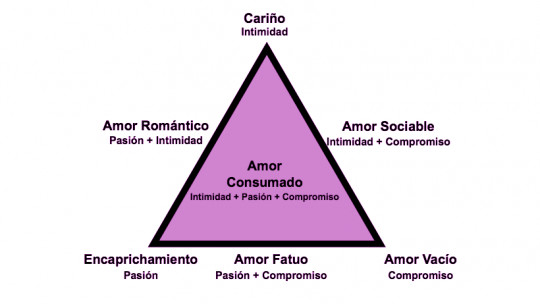
Not only poets and playwrights talk about love. Many researchers in the field of psychology have tried to explain this feeling. Over the last century, different theories have appeared that try to explain love in a rational way.
Love is a universal emotion, but it is one of the most complex; it seems that no two people ever love in the same way, and these differences are often a source of conflict between people. Although love also causes internal psychic problems.
In 1986, American psychologist Robert Stenberg proposed the triangular theory of love. According to Stenberg’s triangular theory, the three characteristic elements of love are: passion, intimacy and commitment, and the different types of relationships arise due to the different combinations that occur between them. In this article we will talk about fatuous love a type of relationship that arises from passion and commitment, but where there is no intimacy.
What is fatuous love?
Fatuous love is a form of love that Stenberg describes as immature. In this type of love, commitment and passion occur, but intimacy does not. Normally, they are whirlwind courtships in which passion motivates a commitment, but there is no stabilizing influence of intimacy, so the relationship does not last over time. They tend to be very impulsive couples.
The focus in the relationship is on the physical attractiveness of the person you love, which outweighs other personality characteristics. Without having a deep foundation, a person can feel in love this way about different people and at different times. According to Stenberg, fatuous love is a feeling similar to falling in love, which appears as something chemical and irrational and does not respond to the passage of time and the intimacy that arises over the course of the relationship.
Fatuous love, also known as crazy love, is the type of impulsive romance we see in great romantic tragedies. It is passion that dominates and it cannot be controlled. In this type of love the other person is treated as a perfect being – almost divine – but this appreciation is not real. The other is more an object of our love, than a person who exists with all his complexities and defects. There is no commitment to last more than a fleeting moment, since it is falling in love that sustains the relationship.

Fatuous love has no depth or real substance, since it is a frivolous whim of a couple or romance, there is no concept of commitment, necessary to maintain any type of relationship, whether romantic or not. True love stories have a stability and closeness that is built over time and with will and is not seen in relationships dominated by illusions.
The person involved in this type of relationship dominated by illusions would seem to have never experienced the real world – or refuses to do so. There could be different psychological problems, which is why a person always gets involved in unrealistic relationships, such as Peter Pan syndrome or other conditions that are characterized by showing emotional immaturity. Although also the fear of abandonment or other types of consequences derived from past experiences can cause us to opt for a lack of commitment in relationships
This type of love is common in adolescents, since they have not grown enough to have mature judgment and idealization is enhanced by the rush of hormones produced by the loved person.
The triangular theory of love
As we have seen, psychologist Robert Sternberg’s theory describes the types of love based on three different scales: intimacy, passion and commitment. The interaction of these three elements gives rise to different forms of romantic love.
The three components form the triangle-shaped metaphor that is used to describe love and gives the theory its name. The different components show different characteristics of love, and when all are present, true love can exist. Let’s see what these features are:
Privacy
Privacy and intimacy are related to the feelings that generate warmth in a loving relationship Privacy relates to the space between people, and intimacy relates to the connection between people.
Passion
Passion is what causes attraction, sexual desire and is responsible for the beginning of the loving relationships that we know in our culture and time. The passion component of a romantic relationship encompasses all the motivations and other forms of excitement that involve the experience of passionate romance
Commitment
Deciding to love someone and committing to a relationship are two parts of the decision/commitment component, but they may not occur together. The decision component has to do with the determination, in the short term or present, that one loves another person. The commitment component has to do with a long-term decision to maintain love
As we see, these two aspects of decision/commitment are different things and do not have to be connected, one can decide to love someone (now) without being committed to a long-term relationship, or one can commit to a relationship without actually deciding. who loves his partner.
The other forms of love according to the triangular theory
The importance of the components of love can change from one relationship to another, and even over time, within the same relationship. All three parties work together in a relationship: for example, greater commitment can lead to more intimacy or passion, and more intimacy can lead to more passion or commitment. Generally, components are separate entities, but they influence each other Different types of love can be generated by focusing on specific combinations of the parts.
On the other hand, there are seven combinations of the three elements of love: passion, intimacy and commitment, the presence of one component or the combination of two or more components create different love experiences. And although none of them are true cases on their own, they do serve to describe the type of relationships and their characteristics. In addition to fatuous love, let’s see what forms of love exist:
1. Friendship
In the type of love called friendship, intimacy is the main emotional component. This means that there is no passion or physical attraction between people and there is usually no stipulated long-term commitment between the two members of the couple to stay together or have a life together, only affection.
2. Infatuation
Passion alone does not indicate the formalization of a relationship. In fact, many people fall in love at first sight, without knowing the other person very well. Infatuation applies when there is passion present, but there is no commitment or intimacy It’s more of a conquest.
3. Empty love
- Components: Commitment
When two people are committed to being together, but there is no passion between them, no good communication, and sometimes not even intimacy, it is called empty love. Only the commitment is present and sometimes the couple is only interested in being together to comply with social norms or not be alone.
4. Romantic love
- Components: Intimacy and passion
Romantic love is the tragic love that we see in movies, when two people have an intimate connection, There is passion between them, but there is no commitment to be together long term either due to circumstances or because one of the two members of the couple does not want to continue with the relationship.
5. Companionship or sociable love
- Components: Taste and Intimacy
Some couples have a pleasant and satisfying relationship because they have been together for a long time, despite no longer having passion or sexual desire for each other. They are engaged, they are intimate, they may even have children, in this case: their love, their history together, is what keeps the relationship going. This is called sociable love and It happens in many marriages
6. Consummate love
- Components: Intimacy, passion and commitment
Only a few people are able to maintain passion, commitment and intimacy in their relationship. The consummate love It is the love that arises when these three elements are maintained over time despite the possible challenges that arise over the course of the relationship.
Conclusion
According to the triangular theory of love, there are three essential components: intimacy, passion and commitment that constitute the different forms of romantic relationships. All three components are necessary to form a healthy couple, but the amount of each component that a relationship needs can change from one person to another, or over the course of the same relationship.
Knowing how the three parts work can help identify areas of the relationship that need improvement or also discover internal problems. For example, if you realize that most of your relationships are of the fatuous love type and are only based on the initial spark, there may be an underlying emotional problem that needs attention.








